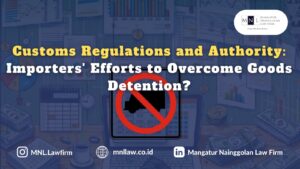
Introduction
Not all goods can be imported freely due to prohibitions and restrictions (LARTAS) imposed by the state. In practice, the Directorate General of Customs and Excise has the authority to take action against goods suspected of violating these regulations. However, problems arise when law enforcement actions are taken without citing the articles that have been violated. This situation raises fundamental questions: are such actions still legally valid, and what can importers do?
What is the Purpose of Prohibitions and Restrictions on Goods?
The stipulation regarding restrictions on imported goods aims to protect national security or the public interest, whether in the social, cultural, or moral spheres of society, as well as to protect intellectual property rights. The enforcement of import restrictions is also intended to protect human life and health, prevent damage to the environment and ecosystems, and is based on international agreements. This also includes preventing all forms of international trade in fauna or flora listed in the CITES Appendix, which is a list of species whose trade needs to be monitored and whose member countries have agreed to restrict trade and stop the exploitation of endangered species.
Provisions on the Prohibition of Importing Goods
Provisions regarding prohibited and restricted imported goods are regulated in Law No. 17 of 2006 on Customs.
Article 53 paragraph (3)
“All prohibited or restricted goods that do not meet the requirements for import or export, if notified by customs notification, at the request of the importer or exporter:
- Export shall be canceled;
- Re-exported; or
- Destroyed under the supervision of customs officials
Unless otherwise stipulated for the goods in question based on applicable laws and regulations.”
Article 53 paragraph (4)
“Goods that are prohibited or restricted from being imported or exported that are not declared or are declared incorrectly shall be declared as goods controlled by the state as referred to in Article 68, unless otherwise stipulated for the goods in question based on applicable laws and regulations.”
Customs and Excise Authority
The authority of Customs and Excise is regulated in PerDirjen BC No. P – 26/2010
Article 2 paragraph (1)
“Customs and Excise officials have the authority to seal items in the customs field, including imported goods for which customs obligations have not been fulfilled, exported goods or other goods that must be monitored, goods and means of transport that have been detained, buildings or storage facilities for imported or exported goods that have been detained, and places or rooms for storing documents related to customs activities.”
Article 2 paragraph (3)
“Sealing as referred to in paragraphs (1) and (2) shall be carried out in the context of:
- enforcement, investigation, audit, seizure in the context of tax collection by means of a writ of execution; or
- security for goods for which customs and/or excise obligations have not been fulfilled and/or other goods that must be monitored.”
However, within its authority to take action as described in PerDirjen BC No. P – 26/2010 Article 2 paragraphs (1) and (3), Customs and Excise Officials who carry out enforcement shall issue an Enforcement Evidence Letter stating the reasons for the enforcement or the type of violation and deliver the Enforcement Evidence Letter to the carrier/owner of the goods or their representative, obtaining a receipt from the relevant party.
Goods Not Subject to Prohibition and Restrictions But Detained, Then What?
Based on Government Regulation No. 21 of 1996 Article 11, which essentially regulates the mechanism for Objections to the Minister of Finance, owners and/or their representatives may submit a written objection to the Director General or designated official within a maximum period of 30 (thirty) days from receipt of the Proof of Action (Prevention) Letter, with the following conditions:
- Stating the reasons for the objection; and
- Attaching supporting evidence.
Conclusion
From the above description, it can be concluded that the existence of prohibitions and restrictions (LARTAS) on imported goods aims to protect national interests and maintain social, cultural, economic, and environmental balance. Customs and Excise does have the authority to take action, seal, or prevent imported goods that are suspected of violating regulations, but every action must be accompanied by a clear legal basis in the form of a Letter of Evidence of Action. If imported goods are actually legal but are still detained, importers have the legal right to submit a written objection to the competent authority within a specified period. Thus, legal certainty for importers is guaranteed, while ensuring that the authority of Customs and Excise is exercised in accordance with the principle of legality and does not harm business actors who comply with the rules.
Author :
- Petrus Gabe Pandapotan, S.H.
